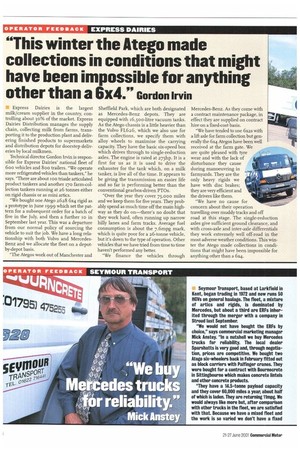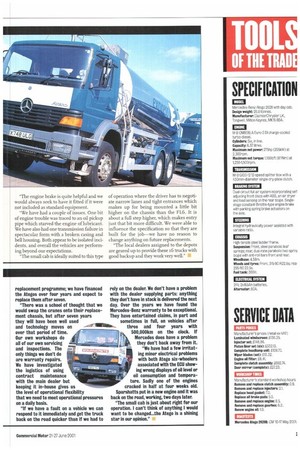"This winter the Atego made collections in conditions that might have been impossible for anything
Page 26

Page 27

If you've noticed an error in this article please click here to report it so we can fix it.
other than a 6)(4." Gordon Irvin
Express Dairies is the largest milk/cream supplier in the country, controlling about 30% of the market. Express Dairies Distribution manages the supply chain, collecting milk from farms, transporting it to the production plant and delivering finished products to supermarkets and distribution depots for doorstep deliveries by local milkmen.
Technical director Gordon Irvin is responsible for Express Dairies' national fleet of Goo vehicles and 800 trailers. "We operate more refrigerated vehicles than tankers," he says. "There are about TOO triaxle articulated product tankers and another 170 farm-collection tankers running at 26 tonnes either on rigid chassis or as mini artics.
"We bought one Atego 2628 6)cq. rigid as a prototype in June 1999 which set the pattern for a subsequent order for a batch of five in the July, and then a further io in September last year. This was a departure from our normal policy of sourcing the vehicle to suit the job. We have a long relationship with both Volvo and MercedesBenz and we allocate the fleet on a depotby-depot basis.
"The Ategos work out of Manchester and Sheffield Park, which are both designated as Mercedes-Benz depots. They are equipped with 16,500-litre vacuum tanks. As the Atego chassis is a little heavier than the Volvo F L626, which we also use for farm collections, we specify them with alloy wheels to maximise the carrying capacity. They have the basic six-speed box which drives through to single-reduction axles. The engine is rated at 275hp. It is a first for us as it is used to drive the exhauster for the tank which, on a milk tanker, is live all of the time. It appears to be giving the transmission an easier life and so far is performing better than the conventional gearbox-driven PT0s.
"Over the year they cover 75,000 miles and we keep them for five years. They probably spend as much time off the main highway as they do on—there's no doubt that they work hard, often running up narrow hilly lanes and farm tracks. Average fuel consumption is about the 7.6mpg mark, which is quite poor for a 26-tonne vehicle, but it's down to the type of operation. Other vehicles that we have tried from time to time haven't performed any better.
"We finance the vehicles through Mercedes-Benz. As they come with a contract maintenance package, in effect they are supplied on contract hire on a fixed-cost basis.
"We have tended to use 6x2s with a lift axle for farm collection but generally the 6x4 Ategos have been well received at the farm gate. We are quite pleased with tyre wear and with the lack of disturbance they cause during manoeuvring in farmyards. They are the only heavy rigids we have with disc brakes; they are very efficient and the drivers like them.
"We have no cause for concern about their operation travelling over muddy tracks and off road at this stage. The single-reduction axles give sufficient ground clearance, and with cross-axle and inter-axle differentials they work extremely well off-road in the most adverse weather conditions. This winter the Atego made collections in conditions that might have been impossible for anything other than a 6x4. "The engine brake is quite helpful and we would always seek to have it fitted if it were not included as standard equipment.
"We have had a couple of issues. One bit of engine trouble was traced to an oil pickup pipe which starved the engine of lubricant. We have also had one transmission failure in spectacular form with a broken casing and bell housing. Both appear to be isolated incidents, and overall the vehicles are performing beyond our expectations.
"The small cab is ideally suited to this type of operation where the driver has to negotiate narrow lanes and tight entrances which makes up for being mounted a little bit higher on the chassis than the FL6. It is about a full step higher, which makes entry just that bit more difficult. We were able to influence the specification so that they are built for the job—we have no reason to change anything on future replacements.
"The local dealers assigned to the depots are geared up to provide these 16 trucks with good backup and they work very well."
































































































